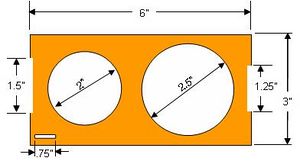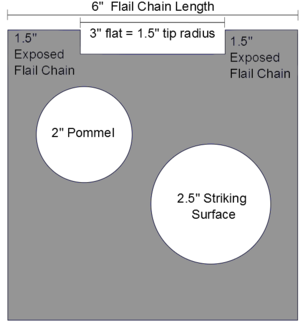Dimension template
From BelegarthWiki
(Outdated: page needs a lot of revision. Maybe merge it into "constructing a weapon check template" and then a redirect? (might be easier than two pages)) |
|||
| Line 3: | Line 3: | ||
A dimension template is used during weapons check to test whether a weapon fulfills the dimension requirements listed in the Book of War. | A dimension template is used during weapons check to test whether a weapon fulfills the dimension requirements listed in the Book of War. | ||
| − | [[Image:Weapon Checking Template.jpg|300px|thumb|right|Here is an example of | + | [[Image:Weapon Checking Template.jpg|300px|thumb|right|Here is an example of an outdated template]] |
| − | [[File:Weapon Check Template 2.png|300px|thumb|right| | + | [[File:Weapon Check Template 2.png|300px|thumb|right|Another example]] |
| − | Functions: | + | Functions ('''some of which are now outdated'''): |
*1. 6" side for checking flail chain length | *1. 6" side for checking flail chain length | ||
*2. 3" side for checking sword flat width | *2. 3" side for checking sword flat width | ||
| Line 27: | Line 27: | ||
---- | ---- | ||
| − | '''NOTE:''' The rules for weapon checking have changed since | + | '''NOTE:''' The rules for weapon checking have changed since the first (yellow) template was designed. In particular, there is no longer minimum sword edge width. Additionally, the 3" flat minimum is only required for swords with semi-circular tips which pass more than .5" through a 2.5" hole. |
| + | |||
| + | '''See also:''' [[Constructing a Weapon Check Template]] | ||
Revision as of 06:29, 30 April 2014
A dimension template is used during weapons check to test whether a weapon fulfills the dimension requirements listed in the Book of War.
Functions (some of which are now outdated):
- 1. 6" side for checking flail chain length
- 2. 3" side for checking sword flat width
- 3. 1.25" notch for checking sword edge width
- 4. 1.5" notch for checking amount of exposed flail chain (no more than 1.5")
- 5. 2" hole for checking pommel diameter
- 6. 2.5" hole for checking arrow heads as well as weapon tips
- 7. .75" slot cut near a corner for attaching a tape measure
When using a template, never force a weapon through. The extra pressure causes the foam to compress and results in failing a passable weapon. The weight of the template is generally enough to drop it onto a weapon tip or pommel and it will slide down if the weapon fails.
For people using a .5" thick template, if any portion of the weapon that passes through the other side means it has failed.
When in doubt or using someone else's template, always start weapons check by double checking the template's measurements.
NOTE: The rules for weapon checking have changed since the first (yellow) template was designed. In particular, there is no longer minimum sword edge width. Additionally, the 3" flat minimum is only required for swords with semi-circular tips which pass more than .5" through a 2.5" hole.
See also: Constructing a Weapon Check Template

